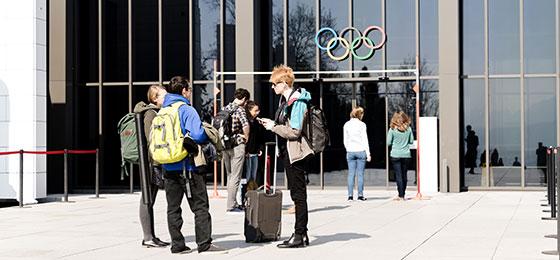3rd programme meeting of NRP 72: focus on implementation

Over 130 participants discussed the progress made in the research projects to date and how results could be implemented.
NRP 72 is approaching the halfway mark and many research projects are in a crucial phase. Consequently, many contributions at the third programme meeting, which took place at the Olympic Museum in Lausanne on 27/28 March, went into considerable depth. Over 130 participants engaged with 45 very different research projects and showed great mutual interest. Christoph Dehio, president of the Steering Committee, concluded: "I observe that we are all getting much better at understanding the language of disciplines that aren't our own. This greatly benefits our research community."
Module 1: Structures and legal conditions for new surveillance
In three moderated discussions the focus shifted away from individual projects towards the shared concern of how the results should be implemented. In Module 1 ("Development and spread of resistance"), a topic of great debate was how resistance data from human medicine, veterinary medicine and environmental sciences could be linked.
It became clear that new genomic data could lead to a quality leap in the understanding of antimicrobial resistance and in particular areas of the national surveillance, but in practice there is a lack of data standards and legal bases. This challenge concerns the authorities in particular. Corinne Corradi, head of the human medicine project of the national antibiotic resistance strategy (StAR), confirmed their interest in recommendations for integrated surveillance: "Good surveillance is important for a rapid response to outbreaks of illnesses but it is also essential if we want to assess the efficiency of measures."
Module 2: Industry partners for the next phase
In Module 2, the debate centred on how the new approaches that are developed in the course of the NRP could be taken to the next level after the end of the programme. Industry partners and funding organisations will be key if we are to move from discovery to drug development.
In this regard, some key players were represented at the meeting with Laura Piddock, director of scientific affairs at the Global Antibiotic Research and Development Partnership (GARDP), who also gave a presentation at the meeting, as well as two members of the Steering Committee: Peter Frey of Innosuisse and Malcolm Page of the funding organisation Carb-X (Combating Antibiotic Resistant Bacteria).
It became clear that many new funding and sharing opportunities have been created. An important aim of the module "New drugs and faster diagnostic techniques" is to find the best way of benefiting from these opportunities.
Module 3: Adapt guidelines and training
The participants believe that politics and the media will play an important role in implementing the measures developed in Module 3 "Optimised use of antibiotics". Furthermore, they all agreed that new results should be fed into medical guidelines as soon as possible.
At the same time it was noted, that many practitioners in human and veterinary medicine tend to stick to what they learned during their training and do not always keep abreast of the latest guidelines. This makes it all the more important to teach new findings at university.
This concern was also shared by Noëmie Boillat Blanco, who had investigated a way to speed up pneumonia diagnosis in her NRP 72 project. "Our approach is simple but it requires the use of new diagnostic tests. We observed that it takes doctors a while before they trust the test results - and adjust their way of prescribing antibiotics accordingly. In our study, they also need basic knowledge of ultrasound equipment, which few GPs have. But the next generation of GPs is learning how to use point-of-care ultrasound as part of their training. They will find it easy to handle.
Kick-off for programme synthesis
In the course of the day, several key areas were identified; they will inform further knowledge transfer measures and play a central role in the programme synthesis report. The aim of the synthesis is to integrate the results of individual projects into a broader context. It will provide a basis for recommendations for stakeholders in politics, the economy and society. In one specialist area, namely diagnostic methods, the synthesis process was started with a workshop on the afternoon of the second day (see link to interview below).
After the productive 2019 meeting, much can be expected of next year's meeting. It will take place on 24/25 March 2020 in Thun.
- Gallery
- Diagnostics Workshop: Interview
- Accompanying study NRP 72
